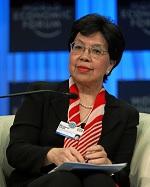 |
| WHO Director-General Margaret Chan |
In July, an independent panel charged with assessing the World Health Organization's response to the Ebola crisis released a scathing report blasting the organization for delaying emergency procedures to control the outbreak, which ultimately killed more than 11,000 people in West Africa. Now WHO's director-general, Margaret Chan, is speaking out, vowing to revamp the organization's procedures for responding to emerging diseases--an effort that includes improving its coordination with animal health agencies around the world.
In an exclusive interview with the GroundTruth Project and NOVA Next, Chan acknowledged that more than 70% of emerging diseases come from animals. Ebola, which originated in bats, was a prime example. When asked how society can prevent diseases from jumping to people in the future, Chan said WHO would need to take a leadership role in controlling the international spread of dangerous pathogens.
"We work closely with our animal health partners, the Food and Agriculture Organization and the World Organisation for Animal Health, to strengthen the monitoring, assessment, control of, and response to diseases of animals which have crossed or potentially can cross the species barrier and infect humans," she said, "and to identify and implement coordinated strategies to reduce the risks to human health."
She added that at the World Health Assembly in May, an agreement was struck to review the effectiveness of international health regulations during the Ebola outbreak and to recommend improvements. "A significant part of these regulations is about the surveillance capacity of countries to identify disease outbreaks early," Chan said. Chan is also overseeing the establishment of a "health emergency workforce" to better respond to emerging diseases.
Chan also stressed the importance of controlling antibiotics resistance. She noted that in 2014, WHO initiated a plan to stem the problem by improving awareness of antibiotics resistance and optimizing the use of the drugs. Problem is, only one-quarter of countries have national plans for dealing with antibiotics resistance, Chan said. "WHO is focusing on supporting countries to develop national action plans on antimicrobial resistance."
Some of Chan's initiatives have garnered mixed support from animal health organizations. After WHO released its action plan on antimicrobial resistance earlier this year, HealthforAnimals (formerly the International Federation for Animal Health) expressed concerns that overreacting to the antibiotics problem could endanger animals that sometimes need the drugs to control inflammatory conditions.
At the same time, several organizations are calling for improved access to drugs that would help reduce the need for antibiotics. In June, HealthforAnimals hosted the 4th Global Animal Health Conference, where attendees brainstormed ways to improve the distribution of key animal vaccines to farmers in Africa. The event was sponsored by the Bill & Melinda Gates Foundation, which has been actively working to improve livestock health around the world.
- access NOVA's Chan interview here